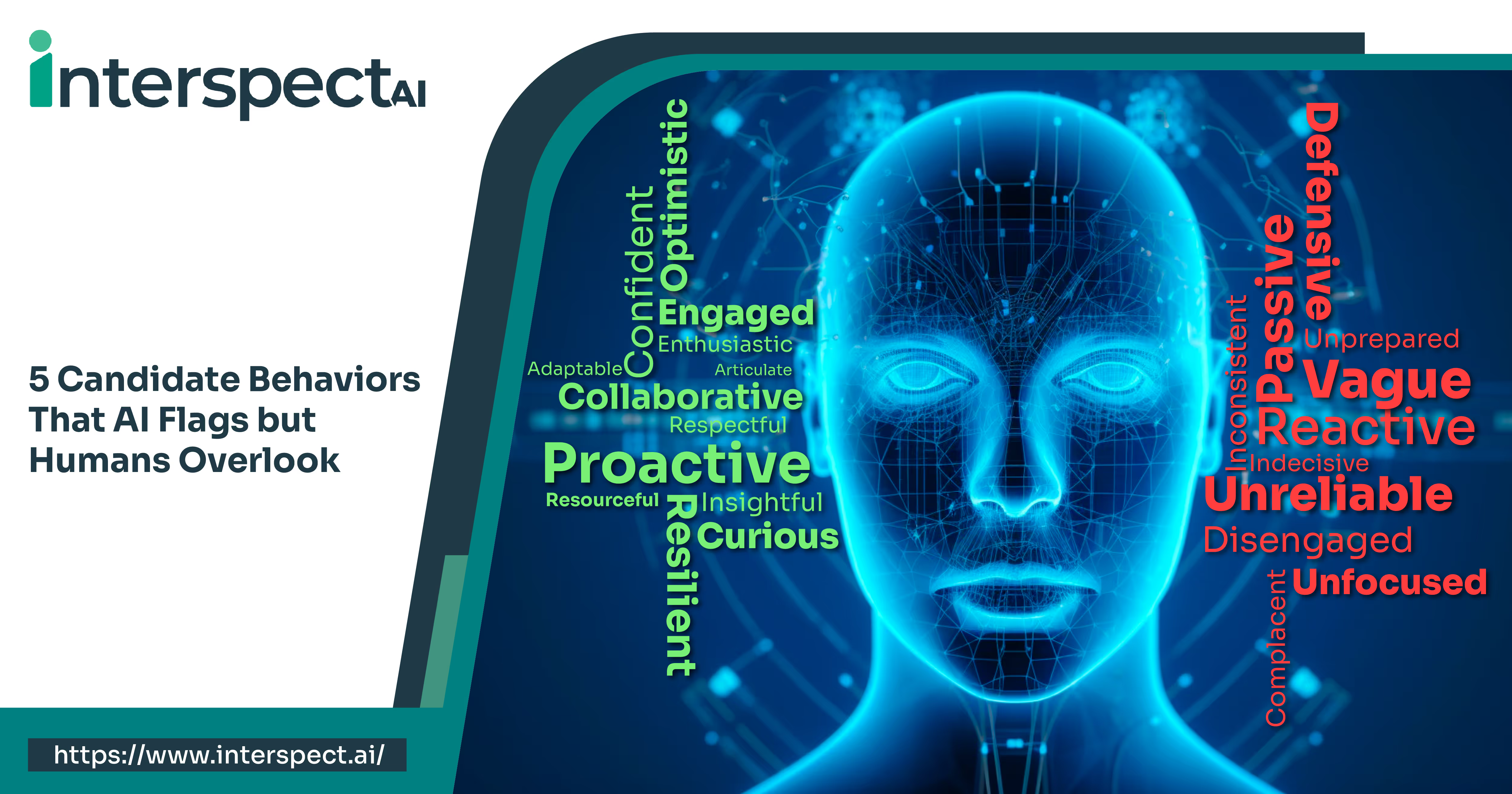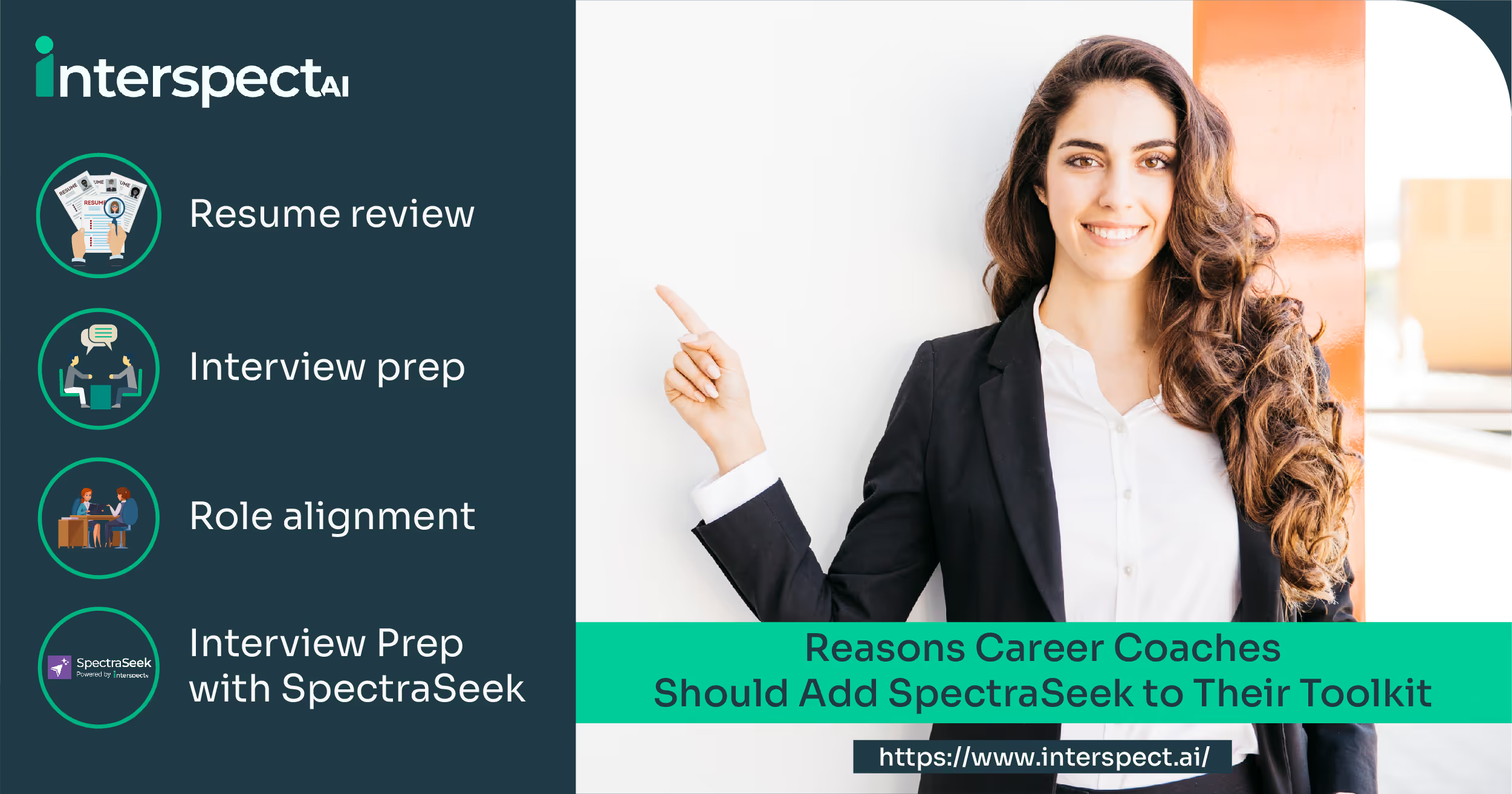
For decades, the human interviewer has been the gold standard of hiring. Relying on instinct, experience, and personal rapport, hiring managers have made countless decisions based on gut feelings and the nuances of face-to-face interaction. However, this human-centric approach is also prone to a wide range of unconscious biases and oversights. In the fast-paced, high-volume world of modern talent acquisition, these seemingly minor missed cues can lead to major hiring mistakes.
This is where AI-powered interview platforms like InterspectAI are not just a tool for efficiency but a crucial partner in objectivity. While a human interviewer might be distracted by a resume detail or a charming anecdote, an AI agent analyzes every element of an interaction with unwavering consistency. It can detect subtle behavioral patterns that a human brain, even the most experienced one, is trained to ignore.
Here are five key candidate behaviors that AI flags but humans often overlook, and why they matter.
1. Inconsistent Behavioral Patterns
A human interviewer relies on a candidate's single, curated performance during a 30-minute meeting. If the candidate is prepared and articulate, they may get a glowing review. But what if their answers are subtly inconsistent across different questions or with information on their resume?
InterspectAI's agentic AI-powered interview platform, including its hiring solution SpectraHire, is designed to track and analyze these patterns. They can detect inconsistencies in a candidate's responses by cross-referencing their answers about past experiences. This level of cross-analysis ensures the candidate's stories are not just well-told, but also logically consistent with their stated skills.
2. Leveraging AI for Contextual Communication Analysis
Video interviews provide a glimpse into a candidate's non-verbal communication, but human analysis is often subjective. A nervous candidate might fidget, a quiet one might be misinterpreted as disengaged, and a soft-spoken one might be seen as lacking authority.
InterspectAI's platform analyzes voice, video, and text inputs to provide richer contextual understanding of candidate responses. Its advanced NLP models evaluate the clarity, depth, completeness, and relevance of answers, helping hiring teams gain an objective and structured view of a candidate’s communication style and problem-solving approach. This ensures assessments remain data-driven and consistent, reducing the influence of subjective interpretation.
3. Unstructured and Unclear Language
We've all been in interviews where a candidate's nervousness manifests as rambling, unclear answers. While a human interviewer might dismiss this as normal jitters, AI goes deeper. InterspectAI's platform can score for "relevance and accuracy". This allows it to evaluate not just what a candidate says, but also how they say it, flagging a potential lack of clarity in communication or a tendency to be vague when put on the spot. This insight is a strong predictor of effective communication and problem-solving skills.
4. The Absence of Curiosity
A candidate who is truly engaged with a role will have questions. They will want to know about the company culture, the team, and the challenges of the job. But in a rushed, half-hour interview, a human can easily overlook a candidate's lack of questions or their reliance on generic, pre-prepared inquiries.
InterspectAI's AI agents facilitate a conversational, two-way interview, providing "real-time responses to candidate questions." The absence of genuine curiosity is a significant flag, signaling low enthusiasm, which is an invaluable insight for identifying candidates who are genuinely invested in a role.
5. Lack of "Overall Fit" Metrics
Humans often rely on a gut feeling for "culture fit," which is a highly subjective and often biased assessment.
InterspectAI's platform provides "automated interview scores and insights instantly post-interviews across technical and behavioral metrics and overall fit." This data-driven approach allows hiring teams to move past subjective impressions and make a more objective assessment of a candidate's compatibility with the role and organization. This metric, combined with other insights, helps create a comprehensive and objective candidate profile, ensuring you're hiring for true alignment, not just personal chemistry.
Conclusion
AI is not here to replace human expertise; it's here to augment it. By providing an objective, data-driven layer of analysis, platforms like InterspectAI give hiring teams the insights they need to make truly informed decisions. AI acts as a safeguard against the biases and distractions that can cloud human judgment, ensuring you never overlook a great candidate again.
Ready to uncover the hidden potential in your candidates?
Learn more about InterspectAI and request a demo today.
FAQs
Q1: Does AI analysis of behaviors introduce new biases?
InterspectAI is built with "non-profiling algorithms" to minimize bias. By standardizing the assessment and focusing on skills and competencies, the platform removes subjective human judgment, which is far more susceptible to unconscious bias. The AI provides an objective report to guide, not replace, human decision-making.
Q2: Can a candidate "trick" the AI by rehearsing their answers?
While a candidate can rehearse, AI is designed to look beyond surface-level answers. It analyzes subtle cues like consistency, language complexity, and emotional tone. A truly honest and prepared candidate will always perform better on a behavioral assessment, as the AI can detect discrepancies that may indicate a fabricated persona.
Q3: How does InterspectAI ensure data privacy and security?InterspectAI adheres to rigorous security and compliance standards. The platform is SOC2 Type 2, GDPR, CCPA, and HIPAA compliant, with end-to-end encryption. This means data is handled with the highest level of security and in accordance with global privacy regulations, providing peace of mind for both companies and candidates.
Subscribe to The InterspectAI Blog


%201.svg)








